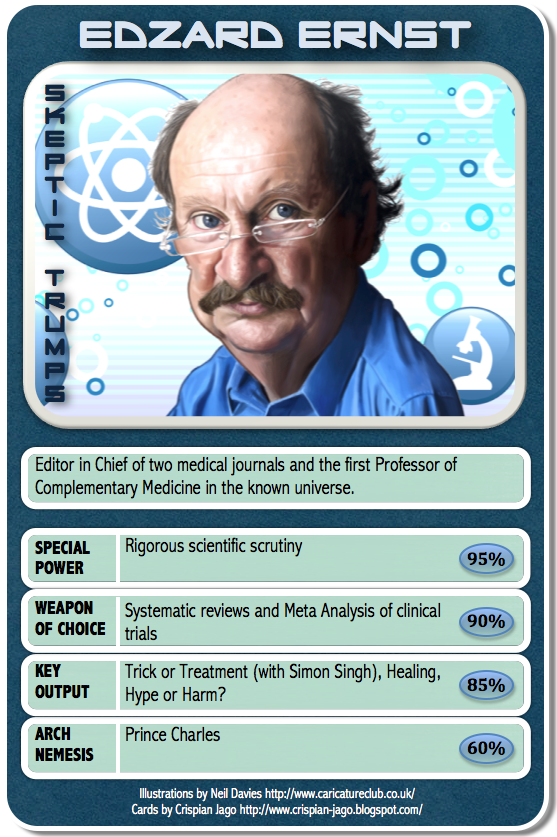For many years during the early 2000s, the WHO had also been working on a document that would have promoted homeopathy worldwide. They had convened a panel of ‘experts’ including the Queen’s homeopath Peter Fisher.
Category Edzard Ernst
Cancer patients yearn for hope and are extremely vulnerable to such influences. I do not know a single one who, faced with the diagnosis and all it entails, has not looked at the ‘alternatives’.
…we conducted a review of 200 websites of individual chiropractors and 9 websites of chiropractic associations from Australia, Canada, New Zealand, the United Kingdom, and the United States between 1 October 2008 and 26 November 2008.
Colonic irrigation is the alternative therapy of celebrities (and those who like to imitate them): they tend to use it for all sorts of ailments, predominantly for loosing weight.
The UK ‘Society of Homeopaths’ (SoH) is the largest professional organisation of UK non-doctor, so-called lay-homeopaths. On their website, the SoH made very specific claims about homeopathy; in particular, they listed conditions for which homeopathy had allegedly been proven to be effective. These claims have now thoroughly been debunked, and the evidence the SoH produced in support of their claims has been shown to be misleading, cherry-picked or misinterpreted.
In my last post and several others before, I have stated that consumers are incessantly being mislead about the value of alternative medicine. This statement requires evidence, and I intend to provide it – not just in one post but in a series of posts following in fast succession.
Pyruvate, a ketone and an alpha-keto acid, occurs naturally in the body when glucose is converted into energy. It is part of the Krebs cycle, the complex chain of reactions in which nutrients are metabolised to provide energy. High doses of pyruvate seem to stimulate the breakdown of fat in the body. It is therefore not surprising that pyruvate is used in all sorts of slimming aids; and if the advertising for ‘fat burners’ is to be believed, pyruvate is just the ticket for the desperate slimmer.
Reflexology is one of the most popular of all alternative therapies… The treatment might be enjoyable but the assumptions that underpin it are nonsensical for at least two reasons: firstly, there are no nerve or other connections between a specific area on the sole of a foot and a certain organ. Secondly, the maps which reflexologists employ differ and fail to agree which area corresponds to which organ. Thus there are inconsistencies within the realm of reflexology and there are inconsistencies in relation to the known facts regarding physiology, anatomy etc.
The ‘law’ stipulates that, if a scientist investigating alternative medicine is much liked by the majority of enthusiasts in this field, the scientist is not doing his/her job properly. In any other area of healthcare, such a ‘law’ would be absurd. Why then does it seem to make sense, at least to some degree, in alternative medicine? The differences between any area of conventional and alternative medicine are diverse and profound.
Edzard Ernst has one of the most impressive collections of letters behind his name that I’ve ever seen: MD, PhD, FMedSci, FSB, FRCP, FRCPEd. Originally from Germany, Ernst began his career as a physician there and, in addition to more standard medical training, also received training in a number of CAM modalities, including acupuncture, herbalism, homoeopathy, and spinal manipulation. He rose through the ranks to become Professor in Physical Medicine and Rehabilitation (PMR) at the Hannover Medical School and Head of the PMR Department at the University of Vienna. At this point in his career, Professor Ernst took a decidedly different direction in life. He applied for and was hired as the first ever Laing Chair of Complementary Medicine at the University of Exeter (named for Sir Maurice Laing, who endowed the position) and so moved to the United Kingdom in 1993. He ascended to the position of Director of the Complementary Medicine Research Group in 2002. – Caleb Lack



